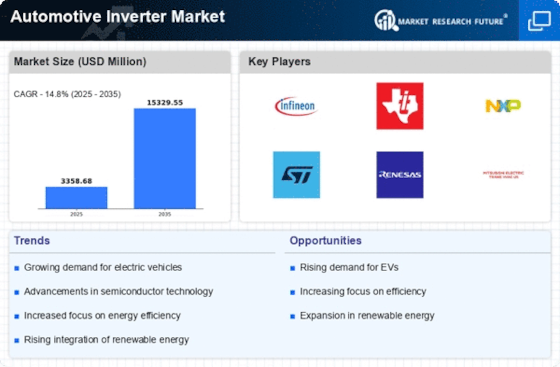Top Industry Leaders in the Automotive Inverter Market

Automotive Inverter Key Players and their Winning Strategies:
Established Titans: Global giants like Bosch, Valeo, Denso, and Mitsubishi Electric leverage their extensive experience, robust R&D capabilities, and strong OEM partnerships to maintain their pole position. Bosch, for instance, focuses on silicon carbide (SiC) technology for high-efficiency inverters, while Valeo emphasizes modularity and scalability for diverse vehicle platforms.
EV-Centric Challengers: Companies like Vitesco Technologies, Hitachi Astemo, and Hyundai Mobis are emerging as formidable challengers, capitalizing on their deep understanding of EV-specific requirements. Vitesco, for example, boasts a lightweight, compact inverter design, while Hitachi Astemo prioritizes cost-effectiveness through in-house silicon carbide production.
New Entrants and Disruptors: Startups like Suzhou Inovance Automotive and Marelli are shaking things up with innovative approaches. Suzhou Inovance is pioneering gallium nitride (GaN) technology for ultra-fast switching and smaller inverters, while Marelli focuses on software-defined inverters for enhanced adaptability and performance.
Market Share Analysis: Beyond Just Size:
While market size is a crucial metric, a nuanced understanding of share distribution is vital. Factors like:
Product Portfolio: Offering a diverse range of inverters for different power outputs, vehicle types, and applications holds the key to catering to a wider audience.
Geographical Reach: Strong presence in key EV markets like China, Europe, and North America, along with localized production capabilities, are critical for capturing regional market share.
Vertical Integration: Controlling key components like semiconductors and power modules can provide cost advantages and ensure supply chain resilience, leading to a stronger competitive edge.
Emerging Trends: Gearing Up for the Future:
The automotive inverter market is not resting on its laurels. New and exciting trends are reshaping the landscape:
SiC and GaN Revolution: These next-generation semiconductors promise higher efficiency, smaller size, and faster switching speeds, leading to lighter, more powerful inverters and improved vehicle range.
Software-Defined Inverters: Software-based control algorithms enable dynamic adjustments for optimal performance, improved diagnostics, and over-the-air updates, enhancing inverter adaptability and lifespan.
Vehicle-to-Grid (V2G) Integration: Inverters equipped with V2G technology can enable EVs to feed energy back to the grid, promoting grid stability and creating new revenue streams for EV owners.
Overall Competitive Scenario: A Dynamic Race on Electric Avenues:
The automotive inverter market is a dynamic and fiercely competitive space. Established players are facing aggressive challenges from EV-focused companies and disruptive startups. While size and experience remain influential, factors like technology leadership, geographical reach, and vertical integration are increasingly shaping market share. As SiC, GaN, and software-defined technologies gain traction, and V2G integration becomes a reality, the competitive landscape will continue to evolve. Success in this electrifying race will hinge on adaptability, innovation, and a clear vision for the future of electric mobility.
Industry Developments and Latest Updates:
Denso Corporation:
October 26, 2023: Announced collaboration with a university to develop highly efficient GaN-based inverters for electric vehicles.
December 19, 2023: Unveiled a compact and lightweight inverter for e-motorcycles, targeting increased range and performance.
Hitachi Automotive Systems:
November 3, 2023: Launched a next-generation inverter with integrated thermal management system for improved efficiency and reliability.
December 20, 2023: Partnered with a European automaker to develop customized inverters for their upcoming high-performance EV models.
Mitsubishi Electric Corporation:
October 20, 2023: Introduced a multi-stage inverter with improved high-voltage handling capabilities for heavy-duty electric trucks.
December 29, 2023: Announced development of a bidirectional inverter with AI-powered energy management for V2G applications.
Top Companies in the Automotive Inverter industry includes,
Denso Corporation
Hitachi Automotive Systems
Mitsubishi Electric Corporation
Continental AG
Delphi Technologies
Fuji Electric
Valeo Siemens
Lear Corporation
Sensata Technologies, Inc
Toyota Industries Corporation

